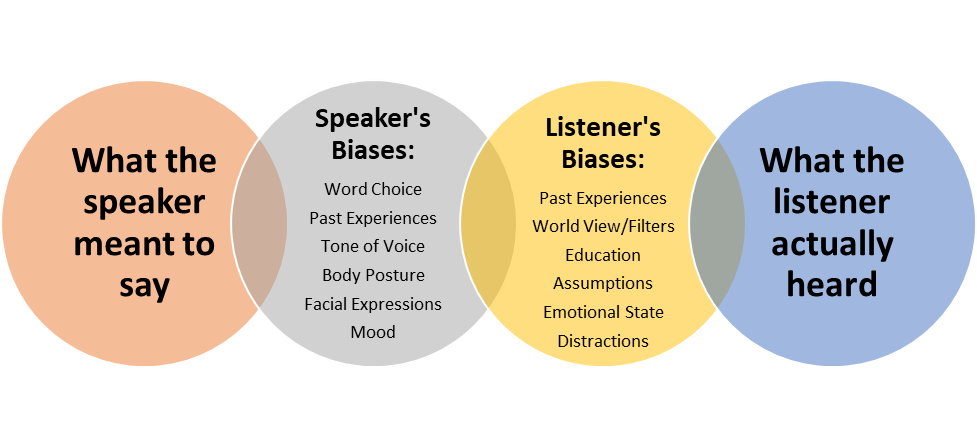
Most of us remember playing the Telephone Game at a party as children: The first player thinks of a sentence, then whispers it in into the ear of the player next to them. That person whispers what they thought they heard to the next person, and so on down the line, until the last player reveals what was whispered into their ear. Usually, the message has dramatically changed between the message the first player thought up and the message the last player heard, often with humorous results.
What is it that makes this communication-chain game work? Clearly, the whispering aspect has some bearing on the results of the game, but that is not the only thing that is happening. The same thing can happen when we try to communicate with others outside of the confines of the Telephone Game.
So what factors are at play that can cause our efforts at communication to go so awry?

The Real Life Telephone Game
When we communicate with another person, the message they receive is based on much more than just the words we choose. Studies show that less than 10% of our message is conveyed by the actual words. Body movements and the expressions on our faces communicate more than half of the meaning the listener receives, and around 40% is conveyed by our tone of voice.
If something outside of our intended message influences our voice, posture, or facial expressions, it is easy to see that what we meant to say can get lost in translation. For example, if a speaker is in pain, or feeling unwell, it can come across to their listener as though they are angry or impatient with the conversation. Our mood, or our feelings about the listener, can alter the tone of our voice, as well as our expressions or body posture, altering how the listener understands our message. Even something as simple as sitting with your arms crossed can give the impression of being defensive.
Many things beyond those physical attributes can cause your misunderstanding. How the listener feels about the speaker can also influence whether they interpret a message more positively or negatively. Even the listener’s mood can bias their interpretation of what is said to them.
In a recent article, we discussed how word choice can be interpreted differently by different people. Our experiences with particular words or phrases can easily stymie effective communication. One example many people can relate to is the phrase, “We need to talk.” Those four words can send shafts of terror through the hearts of anyone who has heard that before they receive very bad news. A speaker may mean it in the most innocent or positive way, but a listener who has heard that phrase prior to being dumped by a partner, or punished by an angry parent, is not going to be able to put aside those experiences to listen with a completely unbiased mind.
Getting It Right
How can we make sure our real life version of the Telephone Game gets us closer to getting our intended message across the line? We cannot control the listener’s mood, or their past associations, but there are some techniques to help minimize misinterpretations:
- Avoid important conversations when we are feeling agitated, distracted, or highly emotional.
- Try to keep our nonverbal cues (body posture, tone of voice, facial expressions) consistent with the message we intend to convey.
- Be attentive. Actively listening when another speaks, and giving them nonverbal signs (like maintaining eye contact and an open body posture) encourages the listener to be attentive and open to your message.
- Keep an open mind. When you jump to conclusions, even if you do not verbally express them, those thoughts are often betrayed on your face, and can steer the conversation in an unintended direction.
- If you know your listener has negative associations with certain words or phrases, avoid using them.
- If you observe that what you are saying is missing the mark, own it. Do not blame the other for misinterpreting, as that will just increase defensiveness. Say something like, “That didn’t sound right. Let me try that again.”
Effective communication is about how well you get your idea across. If the message is being misinterpreted, it is your job to take a step back, figure out where things went wrong, and then try to make them right. After all, it isn’t the fault of the last player in the line of the Telephone Game if he hears “The Pope wears stinking pomade,” after “I hope we’re drinking Kool-Aid,” has filtered through 12 whispering people. The message went wrong somewhere up the line; blame won’t make the message any clearer.
Get the Skills
Want to make sure your conversations don’t turn into the Telephone Game? AdvantEdge Training can help:
- AETC’s Emotional Intelligence training course will teach you how to influence and direct your emotional states, and better understand others’ emotions, with an eye toward anticipating and influencing their behaviors. Our EI classes will help you develop the skills to be more effective in communication, manage conflicts better, and find more common ground in your interactions.
- Effective Business Communication teaches the skills needed to be more effective in your conversations, so that your interactions with others can be more productive, and yield more positive outcomes.











